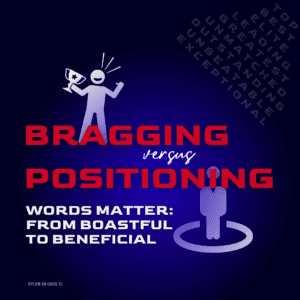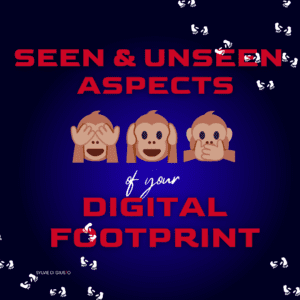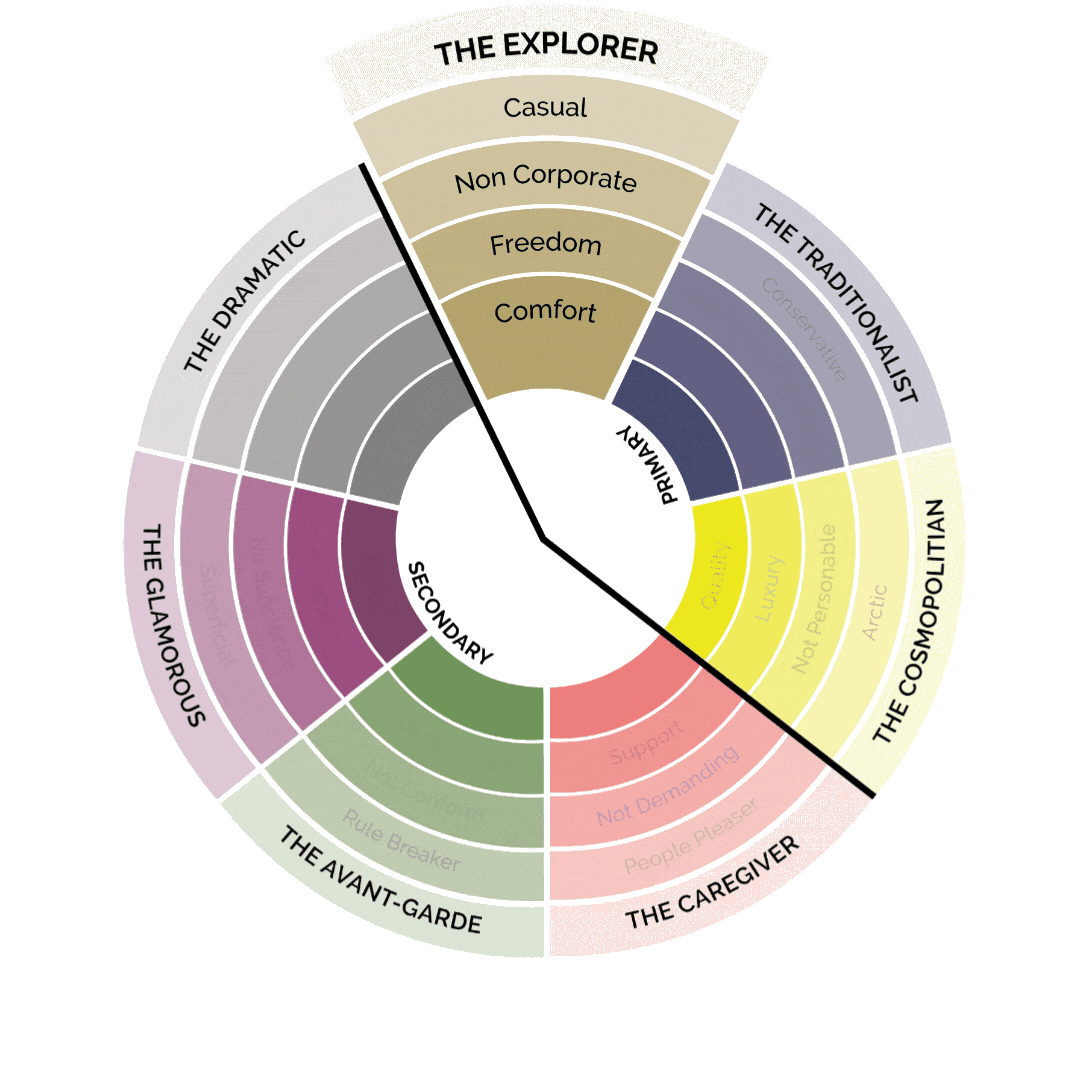From Modesty to Mastery: The Fine Line Between Bragging and Positioning
Imagine this: You’re in a meeting, and a colleague is being praised for their outstanding contributions to a recent project. You know you played a crucial role, yet you sit silently, feeling a mix of pride and frustration. Thoughts race through your mind: Why didn’t they mention my name? Do they even realize how much I contributed? Should I say something?
You leave the meeting and realize you have missed another opportunity to highlight your achievements. On the other hand, you might also still struggle with the idea of raising your hand and sharing your contributions, fearing it might come off as bragging.
This reluctance to celebrate our successes can be a significant barrier to professional growth. It’s not just about recognition from others; it’s about recognizing ourselves. In an era where personal branding and professional visibility are paramount, understanding how to position professional achievements without bragging can be the difference between stagnation and success.
The truth is, acknowledgment and recognition are not just about receiving a pat on the back—they are critical elements in crafting your professional narrative. They build your reputation, establish your credibility, and open doors to new opportunities. Yet, many professionals shy away from sharing their successes, fearing they might come across as bragging.
So, how do we navigate this fine line? How can we ensure that our achievements are acknowledged without feeling like we are boasting? The answer lies in understanding the difference between bragging and strategic positioning.
The Power of Positioning: Moving Beyond the Fear of Bragging
One of the most significant challenges professionals face is the fear of being perceived as bragging. This fear often stems from a misunderstanding of what it means to share one’s accomplishments. Bragging is typically seen as boastful and self-centered, focusing solely on personal gain without consideration for the audience. This perception can make many feel uncomfortable about promoting their achievements, leading to missed opportunities and underappreciated efforts.
Positioning yourself effectively is about more than just standing out; it’s about ensuring that your contributions are recognized and valued. When you strategically share your achievements, you are not only showcasing your skills and accomplishments but also demonstrating your potential for future contributions. This visibility can lead to more opportunities, whether it’s a promotion, a new project, or a role in a different organization.
Understanding the distinction between bragging and positioning is crucial. Bragging often involves exaggeration and a lack of context, whereas positioning is about framing your achievements in a way that highlights their value and impact.
| BRAGGING | POSITIONING |
|---|---|
| Self-centered and boastful: The focus is primarily on oneself without considering how the information is perceived by others. | Strategic and thoughtful: The presentation of achievements is planned and considerate, aiming to highlight their relevance and impact. |
| Lacks context or relevance to the audience: The achievements are presented without explaining their significance or impact. | Provides context and relevance: Achievements are framed within a broader narrative, explaining their significance and how they contribute to larger goals or projects. |
| Focuses on personal gain: The intention behind sharing the information is primarily to elevate oneself, often disregarding the audience's perspective. | Highlights the impact and value of the achievements: Emphasizes the positive outcomes and benefits resulting from the accomplishments. |
| Exaggerates accomplishments: There is often a tendency to inflate the details to appear more impressive. | Acknowledges teamwork and collaboration: Recognizes the contributions of others, showcasing humility and a collaborative spirit. |
| Lacks humility: It can come across as arrogant and dismissive of others' contributions. | Builds credibility and trust: The manner of sharing is authentic and transparent, fostering trust and credibility with the audience. |
Words Matter: From Boastful to Beneficial
It’s in the words we choose that we can transform how we present our achievements, ensuring they are seen as valuable contributions rather than boastful claims. The language you use can either position you as a credible professional or make you seem self-centered. Here are some examples that illustrate this difference:
For example, instead of saying, “I am the best at increasing sales,” you could position your achievement by saying, “My contributions to the sales project led to a 28% increase in sales, significantly boosting our revenue and demonstrating our team’s effectiveness.”
I improved our customer service.
By implementing a new customer feedback system, I helped reduce response times by 40% and significantly increased customer satisfaction scores.
I am the top performer in product development.
Leading the product development team, I spearheaded the launch of three new products within six months, resulting in a 25% increase in market share and positive feedback from key stakeholders.
I am the best at managing budgets.
Through careful budget management and cost-saving initiatives, I reduced project expenses by 15%, ensuring we delivered under budget while maintaining high-quality standards.
I won the Employee of the Year award because I am the best.
I was honored to receive the Employee of the Year award, recognizing my efforts in enhancing team collaboration and driving key projects to successful completion.
I was featured in a top industry journal because I'm a leading expert.
I was thrilled to have my research on sustainable practices published in a leading industry journal, reflecting the impact of my work on advancing sustainable initiatives in our sector.
The words we choose can transform how we present our achievements, ensuring they are seen as valuable contributions rather than boastful claims. By strategically positioning your successes, you can shape your professional narrative in a way that highlights your impact and potential. This approach not only bolsters your credibility but also opens doors to new opportunities.
Quantifying Excellence: The Role of Performance and Recognition
Achievements can be broadly categorized into two types: performance-based and recognition-based. Understanding these categories helps you articulate your contributions clearly and compellingly.

Performance-Based Achievements
Performance-based achievements result directly from your own work and efforts. These achievements are often measurable and demonstrate your capability and effectiveness. To effectively position performance-based achievements, quantify them whenever possible. Use specific numbers, percentages, or other metrics to illustrate the magnitude and impact of your work. This adds credibility and allows decision-makers to clearly understand the value you bring.
Here are some examples:
- Increased sales or revenue: “Boosted sales by 30%, resulting in an additional $500,000 in revenue.”
- Improved efficiency or productivity: “Streamlined the workflow process, reducing project completion time by 20%.”
- Successful project completions: “Led a cross-functional team to complete a high-priority project two weeks ahead of schedule.”
- Innovations or improvements: “Developed a new software feature that increased user engagement by 15%.”
- Cost savings: “Implemented cost-saving measures that reduced annual expenses by $100,000.”
- Quality improvements: “Enhanced product quality, leading to a 25% decrease in customer complaints.”
- Market expansion: “Expanded market presence to three new regions, increasing market share by 10%.”
 Recognition-Based Achievements
Recognition-Based Achievements
Recognition-based achievements are those acknowledged by others. These achievements provide external validation of your skills and contributions, enhancing your professional credibility. Recognition-based achievements are powerful because they provide external validation of your skills and contributions. Highlighting these in your professional narrative can build credibility and trust with your audience.
Here are some examples:
- Awards and honors: “Received the ‘Employee of the Year’ award for outstanding performance and leadership.”
- Positive testimonials from clients or colleagues: “Praised by clients for exceptional service, as highlighted in several testimonials.”
- Public recognition in industry publications or platforms: “Featured in ‘Top 100 Innovators’ list by a leading industry magazine.”
- Endorsements or recommendations from leaders in your field: “Received a commendation from the CEO for contributions to the company’s growth strategy.”
- Invited speaker engagements: “Invited to speak at a major industry conference on best practices in project management.”
- Published works: “Published an article in a respected journal, showcasing expertise in sustainable practices.”
- Professional certifications: “Earned certification in advanced data analytics, recognized by industry leaders.”
Think of your achievements not as mere milestones but as the building blocks of your professional legacy. Each acknowledgment, each recognition, is a testament to your journey, your dedication, and your impact. By choosing to position these accomplishments strategically, you are not just telling your story; you are shaping the narrative of your industry, setting new standards, and paving the way for others to follow.
So, the next time you hesitate to share your success, remember this: Your achievements are not just yours—they belong to the collective progress of your field. They are the proof that hard work, innovation, and excellence are not only possible but celebrated. Stand tall, speak proudly, and let your achievements inspire others!

Discover Your Fair Advantage
If you're striving to position your achievements strategically and confidently, understanding how to effectively highlight your unique strengths and "superpowers" is essential. Many professionals grapple with the challenge of differentiating themselves in the corporate world without feeling like they are bragging. Discover Your Fair Advantage is designed to bridge this gap. This book serves as a comprehensive guide, empowering you to uncover, articulate, and leverage your distinctive qualities and capabilities. It provides you with the tools and knowledge needed to navigate the professional landscape with confidence, ensuring your achievements are recognized and your professional narrative is a true reflection of your individual value and expertise.
Interested in more content like this?
Make sure to follow me on Instagram. It’s where I bring my thoughts to life daily. I hope to see you there.
 Recognition-Based Achievements
Recognition-Based Achievements



